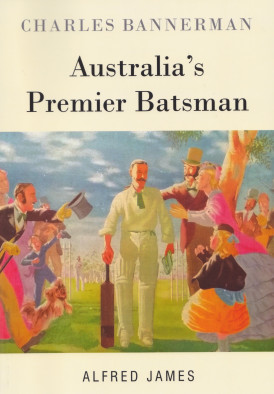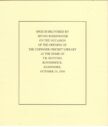Charles Bannerman – Australia’s Premier Batsman
Martin Chandler |Published: 2016
Pages: 146
Author: James, Alfred
Publisher: Cricket Publishing Company
Rating: 3.5 stars

Charles Bannerman was a specialist batsman who opened the batting for Australia in what later came to be recognised as the first ever Test match, way back in March 1877. That unbeaten 165 proved to be Bannerman’s only First Class century, but his fame endures to this day. He will, of course, always be the first man to have scored a century in a Test match, but what an innings it was. There have been more than 2,200 Tests since, but no one has ever surpassed Bannerman’s achievement in scoring 67.3% of his side’s runs. One day they surely will, but I suspect it won’t be in my lifetime, and very possibly not in the lifetime of anyone reading this review.
Despite being just 25 at the time of his great innings there were only two more Tests for Bannerman. In terms of longevity he plays second fiddle to his less famous brother Alick. Three years younger than Charles Alick played alongside his brother on debut, and then over a 15 year period on 27 further occasions. The most important issue facing Bannerman’s biographer is therefore as to why a career that started out in such a blaze of glory petered out in the way that it did.
The problem faced by Alfred James is obvious, Anno Domini. It is the best part of 150 years since Bannerman’s match. The man himself has been dead for more than 80 years and the last of his grandchildren departed this mortal coil a quarter of a century ago. James managed to track down some descendants in the course of his research, but none could add anything to what he already knew, and none had any memorabilia regarding their famous forebear.
The Trove website has opened up a myriad of source material for anyone interest in the early days of Australian cricket, and as a result it has been possible for James to reconstruct large parts of Bannerman’s First Class and Grade careers, although he is restricted by the style of contemporary reporting. There are only the merest glimpses of Bannerman the man, and indeed of the way he played the game.
James was assisted by Bannerman’s cricketing profile. He was a real rarity in his time in that he was a professional. He made his living not only by playing but by coaching and umpiring as well, and in time he became one of the few former Test cricketers to umpire at the highest level, so his name often cropped up in the press. He was also a regular attender at all sorts of sporting events, but particularly at the Sydney Cricket Ground. The book contains some fascinating photographs taken at the ground in the 1920s; Bannerman with Archie Jackson, Don Bradman and, most poignantly, with his old teammate Fred Spofforth.
But does James manage to unravel the reasons behind Bannerman’s loss of form? He certainly had enough material upon which to reach a conclusion, but James is not the sort of biographer to pass judgment. He marshalls all the known facts and it is for the reader to draw his own conclusions as to how much credence there is in the hints about drinking and gambling. No legally recognised standard of proof could possibly be met but, as they say, there is seldom smoke without fire.
For the times in which he lived Bannerman also had a distinctly unconventional private life. He married at 21 but, after his wife gave birth to their fifth child, he took a mistress and with her had two more children. In the end, after the death of his wife he married his mistress but there was clearly much ill-feeling and the drama seems to have been largely played out in the criminal courts. Nothing happened between any of those involved that 21st century readers will consider should be a criminal offence, but in those days in Australia marital desertion clearly was, and the Police Courts seem also to have had control of questions of financial support between husband and wife.
Despite its excellent selection of photographs had this book been written about a man who played fifty years ago I would have been disappointed, but Charles Bannerman – Australia’s Premier Batsman cannot be judged by those standards. Given all the circumstances and the material at his disposal James has done an excellent job on Bannerman, and the book is well worth reading. It might be worth investing quickly though as the book is a limited edition. It will come as a surprise to no one to learn that the limitation is 165 copies, 121 in a standard hard back. The remaining 44, a number selected to reflect the number of First Class matches in which Bannerman played, are bound in leather and have a number of signatures. Both are available from Roger Page.






An incomplete review. Mr Chandler has clearly read Gideon Haigh’s review and copied his observation that I “sat on the fence” over the reasons for Bannerman’s loss of form after 1878. The fact is that there is insufficient known evidence to make any decision. Sure, I could have jumped in like Derriman and said that he was a drunkard but we only have Cooper’s letter after Bannerman’s death in 1930 to give any support to that. If I had to make a verdict I’d say it is more likely that he found his family situation in a mess when he returned from the 1878 tour and that his wife was the drunkard. But where do you get positive proof of that? Are we not to write about someone because no one survives who knew him? Remember he umpired 59 first-class matches in hot weather without any complaint from the authorities. It is exaggeration to say that the drama was played out in the criminal courts. Further, my name is Alfred (not “Alf”).
Comment by Alfred James | 9:26am BST 3 October 2016
I consider myself roundly admonished – could have sworn I concluded with the observation that the book was ‘excellent’, but perhaps Mr James didn’t read that far?
Comment by Martin Chandler | 8:46pm BST 4 October 2016
Looks like you hit a raw nerve.
Comment by paul mullarkey | 9:06pm BST 13 October 2016
Some folk you can’t even praise without getting stick Paul
Comment by Martin Chandler | 1:52pm BST 14 October 2016
Seriously though, that was downright nasty and rude.
Comment by paul mullarkey | 9:03pm BST 14 October 2016
It will be a while before I review another of his books, as I suspect my objectivity might be compromised
Comment by Martin Chandler | 9:01am BST 16 October 2016